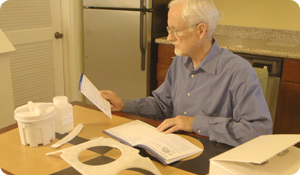
If you’re 50 or older and you’ve been neglecting a colon cancer screening, you could be putting your life in danger. The American Cancer Society recommends that adults age 50 and above have a colon and rectal (often referred to as colorectal) cancer screening every five to 10 years, depending on the testing method used; people at high risk of these cancers should be screened more frequently.
Why is colorectal cancer screening so important? In the U.S., an estimated 133,00 people will be diagnosed, and 50,000 people will die from colorectal cancers this year alone, according to the American Cancer Society. But with proper screening, these cancers can be prevented, or least identified at the earliest stage—and treated successfully.
Colonoscopy: The Gold Standard
There are several methods used to screen for colorectal cancers, but colonoscopy is considered the gold standard, says Sander Binderow, MD, FACS, FASCRS, of Atlanta Colon and Rectal Surgery. This procedure is typically done while the patient is under either general anesthesia or local sedation. During a colonoscopy, a flexible tube with a camera on the end is used to view the inside of the colon and rectum and identify any abnormalities, including ulcers, polyps (growths that if not removed could enlarge and turn cancerous), and inflammation of the lining.
While the method is quite effective, it can be costly and time consuming, and it also requires special preparation—those undergoing a colonoscopy must use laxatives and consume a liquid diet the day before to clean out the bowels, which many people find very off-putting.
Why Some People Don’t Follow the Guidelines
Unfortunately, about one in three adults between the ages of 50 and 75 have not had any kind of colorectal cancer screening, including a colonoscopy. This may be due to the fact that "There is a potentially unpleasant aspect to colonoscopy—including the preparation, needing to take a day off from work, needing a driver/helper, the social stigma, et cetera," Binderow says. Furthermore, people with lower socioeconomic status sometimes have difficulty accessing a colonoscopy.
For these and many other reasons, some people decide to skip the procedure, assuming they aren’t at any real risk of colon or rectal cancer, anyway. This can be a life-threatening mistake: Anyone can develop colorectal cancer, and some people don’t have any symptoms until the disease has progressed.
Marcia’s Story
This was certainly the case for 61-year-old Marcia Mullins of West Virginia, today a colon cancer survivor and a full-time volunteer Colorectal Cancer Awareness Advocate. Back when she turned 50, she didn’t have any major risk factors for colon cancer and decided not to have a colonoscopy. Then, about four years ago, she suddenly experienced severe rectal hemorrhaging and was ultimately diagnosed with Stage 3 colorectal cancer. Her prognosis was grim.
Mullins’s insurance company suggested she get treatment at Memorial Sloan-Kettering Cancer Center in New York City, where she took part in a study that involved a change in the traditional order of treatment. "The treatment and the following surgery was arduous, but with the help of my husband Richard, who was my caregiver, I made it through," Mullins says. "The post-surgery biopsies showed no live cancer cells, so I was designated NED, which means 'no evidence of disease.'"
Today, she remains cancer-free, and has dedicated herself to spreading the word to others about the importance of colon cancer screenings. One important message she shares is that for people who absolutely don’t want to do a colonoscopy, there are some other screening options to consider.
Cologuard: At-Home Screening
One of the latest colon screening methods is an FDA-approved test called Cologuard, which is a non-invasive screening test that people of average risk can do themselves right at home. It involves collecting a stool sample with a special kit and sending it to a lab, where it’s evaluated for DNA markers that indicate a high risk of polyp or cancer. As of April 2015, Medicare pays for this test, and some private insurers are beginning to follow suit. (If your insurance won’t pay, you can expect the out-of-pocket cost to be about $600. This is less than a colonoscopy, however, which can cost up to 10 times this amount if you have to pay out-of-pocket.)
How it Works
"Cologuard uses advanced stool DNA technology to find DNA from abnormal cancer and precancerous cells that shed into the colon,” explains Shashi Kumar, MD, a gastroenterologist with South Hills Gastroenterology Group in Clairton, PA. "I will recommend this test to any patient who is age 50 and older [who is] at average risk for colon cancer and has absolutely refused screening colonoscopy." He notes, "This will not replace screening colonoscopy, which is the gold standard." But he says that Cologuard can identify people who do need to follow up with a colonoscopy. In fact, if the test comes out positive, then a colonoscopy is the next step.
Are You a Good Candidate?
If you’re interested in trying an at-home screening method like Cologuard, you’ll need to talk to your doctor and your insurer to make sure you are a good candidate. If your risk factors are high or you’re experiencing any symptoms, such as rectal bleeding, a change in bowel habits, abdominal discomfort, weakness, anemia, or unexplained weight loss, your doctor will recommend you skip this type of screening and go directly to the colonoscopy.
Sander Binderow, MD, FACS, FASCRS, and Shashi Kumar, MD, reviewed this article.
Sources
Binderow, Sander, MD, FACS, FASCRS. Atlanta Colon and Rectal Surgery. Email interview, March 30, 2015.
Bosolovic, Elisa, physician assistant. South Hills Gastroenterology Group, Clairton, PA. Email interview, March 30, 2015.
Kumar, Shashi, MD. Email interview, March 30, 2015.
Mullins, Marcia. Email interview, March 30, 2015.
"American Cancer Society Recommendations for Colorectal Cancer Early Detection." American Cancer Society. Page last revised February 5, 2015.
American Cancer Society.
"Cancer Facts and Figures 2015." Atlanta: American Cancer Society; 2015.
"Colorectal Cancer Screening Rates Remain Low." Centers for Disease Control and Prevention. Page last updated November 5, 2013.





